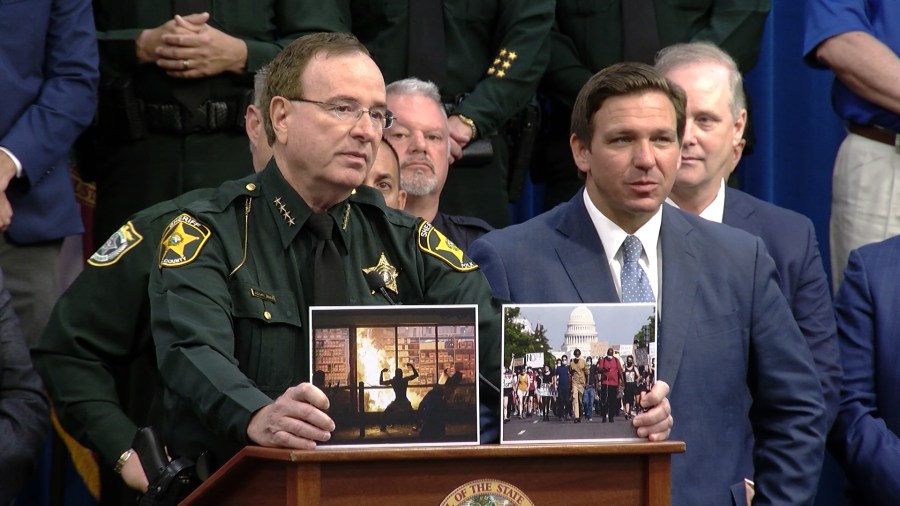WINTER HAVEN, Fla. (WFLA) – Florida’s new “anti-riot” bill has prominent local law enforcement officials divided on its benefits and constitutionality.
“It is the strongest anti-rioting, pro-law enforcement piece of legislation in the country,” said Gov. Ron DeSantis, R-Fla., proudly during the bill signing at the Polk County Sheriff’s Office in Winter Haven Monday.
Gov. DeSantis announced the bill in the same room in late September. He said he chose that location because of Polk County Sheriff Grady Judd’s support for the bill.
“We promised and we delivered,” he said to applause, surrounded by more than half a dozen law enforcement officials.
The governor and lawmakers argue the law’s intent is to target violent rioters, not peaceful protestors. Among other actions, it enhances penalties for crimes committed during a protest, prohibits the taking over of highways, protects monuments and requires arrested protestors to stay in jail until their first appearance.
“If you riot, if you loot, if you harm others, particularly if you harm a law enforcement officer during one of these violent assemblies, you’re going to jail,” said Gov. DeSantis.
Sheriff Grady Judd brought his usual visual aids to make his point: law enforcement officials know the difference between a riot and a lawful protest.

“Pay attention. We’ve got a new law and we’re gonna use it if you make us,” he said. “We’re gonna protect the people.”
West of Polk County, Hillsborough County’s top prosecutor, State Attorney Andrew Warren, calls the law “disappointing” and “unconstitutional.”
“The bill enhances penalties for a lot of crimes that already exist. Simply enhancing penalties is an ineffective and, frankly, lazy way to address public safety,” he said.
According to Warren’s office, in partnership with the federal government, it prosecuted 120 people in connection to one night of unrest in Tampa last spring, including a man who pleaded guilty to setting a Champ’s Sporting Goods on fire.
“You know how many additional people we can now prosecute because of this change in the law? Zero,” he said. “This law doesn’t help us identify the people who are bad. It gives us zero additional tools to go after those people. This law changes nothing.”
Warren said he will not prosecute cases any differently with this law in the books.
However, he is concerned others will.
“This bill left just enough room for prosecutors to abuse the law to criminalize the mere presence at a large public gathering where other people are doing something wrong,” said Warren.
It’s a concern shared by activists, including Black Lives Matter Restoration Polk’s Carl Soto.
Soto interprets the law to say if a couple bad actors act unlawfully at an otherwise peaceful protest, it could lead to mass arrests.
“They decide they want to engage in unlawful activity. Now what that does with this new law, it makes everyone at this assembly subject to be charged with a felony,” said Soto, who said he was unlawfully detained during protests in Minnesota this weekend.
Black Lives Matter Restoration Polk is looking into taking legal action, possibly filing an injunction, in opposition to the new law.
“It’s a first amendment right violation. The verbiage in this bill is extremely broad and it just gives law enforcement the ability to terrorize anyone who is peacefully protesting,” he said.
The bill was signed on the same day as closing arguments in the murder trial of Derek Chauvin, the former police officer accused of killing George Floyd last May.
The governor alluded to potential unrest following the verdict and accused the Minnesota Attorney General of “bungling” the Chauvin case, but did not elaborate.
He left the bill signing ceremony without taking any questions from reporters, saying he needed to catch a flight.






